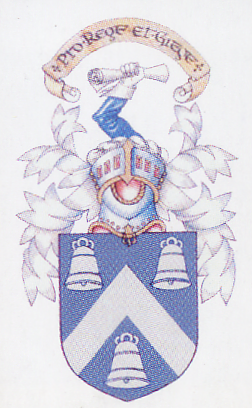|
Former Pupil Biographies
Colonel Robert Hope Moncrieff Aitken V.C.,
C.B. (1826 - 1887)
| Colonel Robert Hope
Moncrieff Aitken was born on 8 February 1826 in Cupar, the seventh of
ten children. He died at Pilmour Cottage in St
Andrews on 18 September 1887. He was a Scottish recipient of the
Victoria Cross, the highest and most prestigious award for gallantry
in the face of the enemy that can be awarded to British and
Commonwealth forces. He married Mary Elizabeth
Atkinson in 1856 in Bengal and they had one daughter. |
 |
At the age of 31 and a
Lieutenant in the 13th, Bengal Native Infantry, Bengal Army during the
Indian Mutiny when the following deeds took place for which he was
awarded the VC:
For various acts of gallantry performed
during the defence of the Residency of Lucknow, from the 30th of June to
the 22nd of November, 1857.
-
On three different occasions, Lieutenant
Aitken went into the garden under the enemy's loopholes in the "Captain's
Bazaar". On two of these occasions, he brought out a number of bullocks
which had been left in the garden;— subsequently, on the 3rd of July, the
enemy having set fire to the Bhoosa Stock in the garden, and it being
apprehended that the fire would reach the Powder Magazine which had been
left there, Lieutenant Aitken, accompanied by other Officers, went into
the garden, and cut down all the tents which might have communicated the
fire to the powder. This was done, close to the enemy's, loopholes. Under
a bright light from the flames. It was almost dangerous service.
-
On the night of the 20 August, the Enemy,
having set fire to the Baillie Guard Gate, Lieutenant Aitken was the first
man in the gateway, and, assisted by some sepoys and a water-carrier of
his Regiment, he partially opened the gate under a-heavy, fire of
musketry, and, having removed the burning wood and straw, saved the gate.
-
On the evening of the 25 September, this
Officer led on twelve sepoys of his Regiment, for the purpose of attacking
two guns opposite the gate referred to, in order to prevent their being
turned-on the late Major-General Havelock's second column. Having captured
them, he attacked and took the Teree Kotee, with a small force.
-
On the morning of the 26 September, with a
small party of his Regiment, he assaulted and captured the barricaded
gateway of the Furreed Buksh Palace, and the Palace itself. On this
occasion, he sprang up against a small wicket gate on the right and
prevented the enemy from shutting it, until, with assistance, it was
forced open, and the assaulting party were thus enabled to rush in. The
complete success of the attack was solely owing to this Officer's
distinguished bravery.
-
In a subsequent sortie on 29 September,
Lieutenant Aitken volunteered to take a gun which still continued firing,
taking with him four soldiers through the houses and lanes to the gun. The
enemy fired on this party from the houses, but they held their ground,
until a stronger party coming up, the gun was upset from its carriage, and
taken into the Residency. Another gun was subsequently taken.
The award of the Victoria Cross was
announced in April 1863. He was promoted from Lieutenant in November 1853,
to Captain and Brevet-Major in February 1861, to Major in July 1867 and subsequently to Lieutenant-Colonel in August
1869. He retired on 25 April 1876 with the honorary rank of Colonel after
30 years service.
In April 1871 he was appointed a Companion
of the Order of the Bath (C.B.) - Military Division (V.R.)
He died in 1887 and is buried in the Eastern Cemetery at St Andrews on the
upper terrace.
He came from a long line of army personnel. His cousin Robert Digby-Jones
also won the Victoria Cross (posthumously) at Ladysmith in 1900.
His Victoria Cross is displayed at the National Army Museum (Chelsea,
England). He is unique in that the decoration ceremony was performed at
the same place, the Residency at Lucknow, and almost on the exact spot
where several of his V.C. actions had taken place. He did not, however,
receive the actual 'medal' on this occasion, as it had been mislaid.
A memorial was erected at the Residency in Lucknow. It reads:
"This monument is erected to the memory
of Colonel Robert Hope Moncrieff Aitken VC Bengal Staff Corps and formerly
of the 13th Regt Bengal Infantry, by some of his surviving comrades and
other friends in token of their appreciation of his sterling worth as a
man, and of the splendid gallantry and chivalrous devotion which he
displayed as a soldier in command of this post, which he held with the
faithful and loyal remnant of the Regiment to which he belonged throughout
the defence of the Residency of Lucknow."
In 'The Madras College' Dr Thompson wrote:
"It was in India that the Victoria Cross was first won by
a former pupil. Major Robert Aitken, who had been gazetted as ensign in
the 13th regiment of Bengal Native Infantry in 1847, won his cross for a
series of acts of valour during the siege of Lucknow during the Indian
Mutiny."
|

